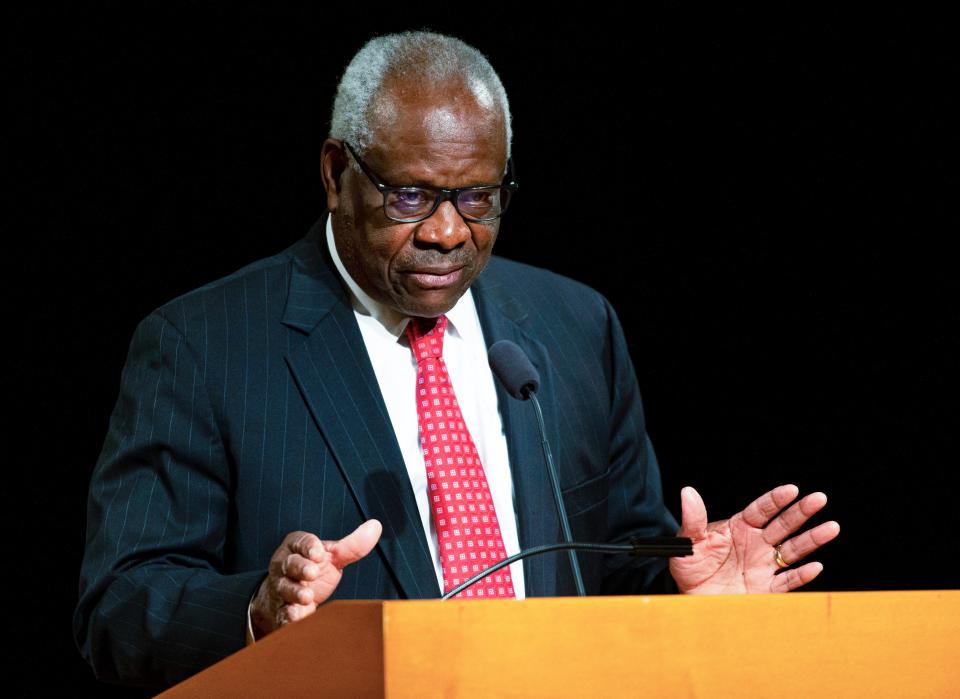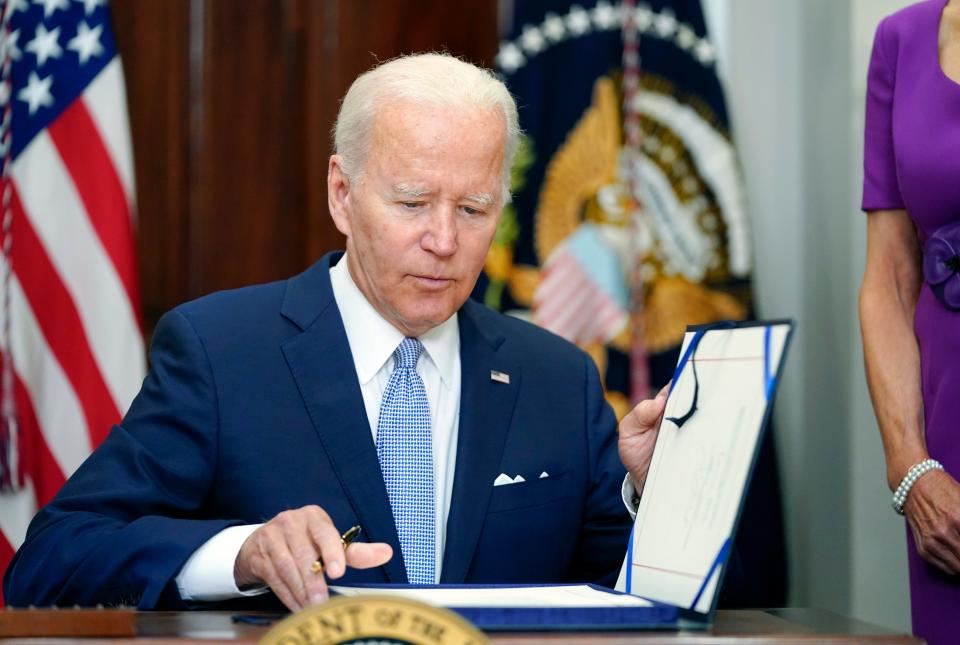'An odd situation': President Biden aims to tighten firearms sales. Hunter Biden is caught in the crosshairs
WASHINGTON – A federal gun law that Hunter Biden is charged with violating is under siege, challenged in court by people who think it is unconstitutional. That puts his father, President Joe Biden, in an awkward position, since he thinks gun background checks should be even tighter.
Courts are grappling with which gun laws should stand and which should be struck down, after a 2022 Supreme Court decision triggered a flood of additional gun-related lawsuits.
In February, a federal judge in Oklahoma dismissed a case related to the same charge Hunter Biden faces by finding it “unconstitutionally vague." The defendant in that case had been pulled over by police, who found a gun and marijuana cigarettes in his vehicle.
In August, the Fifth U.S. Circuit Court of Appeals ruled the law unconstitutional in the case of someone who used marijuana while possessing a gun. “It is a close and deeply challenging question,” the court ruled.
The matter may ultimately be decided by the Supreme Court, which will hear arguments Nov. 7 challenging another provision of the same statute. That provision prohibits someone from possessing a gun while under a court restraining order for domestic violence. A Fifth Circuit appeals panel ruled the statute "fails to pass constitutional muster." Legal experts say the eventual high court decision could be broader.
"We could have the odd situation of the son of a president who is calling for stricter gun laws challenging these charges as violating his Second Amendment rights," said William "Widge" Devaney, a former federal prosecutor now practicing at Baker McKenzie. “Like any criminal defendant, he’s going to use the laws and the arguments available to him, regardless of what his personal beliefs may or may not be."

More: Hunter Biden will plead not guilty to federal gun charges, and wants court hearing by video: lawyer
What gun charges does Hunter Biden face?
The law at stake in the court battles is 18 USC 922, which in nearly four out of five cases is used to stop convicted felons from possessing a firearm. But the section of code contains lesser-known provisions prohibiting gun possession for other reasons.
Hunter Biden was charged under a provision forbidding people who are addicted to narcotics from owning firearms. Biden is accused of lying about his addiction in 2018 in a statement to a gun dealer and on a federal form, and then by possessing the Colt Cobra 38SPL. He faces a maximum of 25 years in prison if convicted on all three charges. He plans to plead not guilty.
Biden’s lawyer, Abbe Lowell, threatened to challenge the constitutionality of the statute.
“We believe these charges are barred by the agreement the prosecutors made with Mr. Biden, the recent rulings by several federal courts that this statute is unconstitutional, and the facts that he did not violate that law, and we plan to demonstrate all of that in court,” Lowell said in a statement.
Rep. Matt Gaetz, R-Fla., questioned whether Biden’s challenge could reach the Supreme Court and potentially set a landmark precedent for the Second Amendment by overturning screening questions for gun ownership.
“Will we be cheering Hunter?” Gaetz asked in a post on X.

What is the 'nation's historical tradition of firearm regulation'?
Uncertainty about which gun laws will stand or fall stems from a 2022 Supreme Court decision called New York State Rifle & Pistol Association v. Bruen. The decision overturned a century-old New York law that had required people to have a "proper cause" to have a firearm and opened the floodgates to challenges to other laws.
The opinion by Justice Clarence Thomas set a legal standard for lower courts to use when reviewing gun laws. To pass constitutional muster, a gun law must be "consistent with this nation's historical tradition of firearm regulation," the court ruled.
Here are some of the challenges that resulted:
In the Oklahoma case, Jared Michael Harrington was charged with unlawful possession of a firearm after police in Lawton pulled him over for failing to stop at a red light in May 2022. Police charged him after finding a revolver and marijuana cigarettes in his car. A federal judge dismissed the indictment and ruled authorities who wanted to disarm him should have charged him with alleged involvement in a shooting, rather than through the drug-use statute.
In the Fifth Circuit, a three-judge appeals panel concluded the statute violated Patrick Daniels' right to bear arms. After pulling him over in April 2022 for driving without a license plate, law enforcement officers found a pistol and a semi-automatic rifle in his vehicle, along with marijuana cigarette butts in the ashtray. He was convicted and sentenced to nearly four years in prison after acknowledging smoking marijuana several days per month. The appeals panel dismissed his indictment, ruling the statute "violates the Second Amendment." History and tradition may support limits on an intoxicated person's right to carry a weapon, but they don't "justify disarming a sober citizen based exclusively on his past drug usage," the court ruled.
The Supreme Court will review an appeals court ruling dealing with Zackey Rahimi, who acknowledged being involved in five shooting incidents in December 2020 and January 2021 in Arlington, Texas. His girlfriend got a civil protective order against him in February 2020, and officers charged him after finding a pistol and rifle while searching his home. Rahimi was convicted of possessing firearms while under a restraining order, and sentenced to more than six years in prison. But Rahimi challenged the statute and an appeals panel ruled the law unconstitutional under Bruen.

What are arguments the Supreme Court will consider?
Government lawyers argue restrictions on gun possession are a legitimate way to reduce violence. Biden administration lawyers asked for a review of Rahimi's decision.
“That holding was profoundly mistaken,” Solicitor General Elizabeth Prelogar wrote in asking for the high court’s review. “Governments have long disarmed individuals who pose a threat to the safety of others, and (the statute) falls comfortably within that tradition.”
But Rahimi’s lawyers argue that the Founding Fathers who drafted the Constitution would have never thought of personal restrictions against gun possession like a protective order, making them unworkable under Bruen.
“This law would have been unthinkable to the founding generation and to most of the Congresses convened in our nation’s history,” the lawyers wrote.

Court challenges come as Biden administration aims to strengthen background checks on gun buyers
Despite the legal challenges, the Justice Department proposed rules in August to crack down on unregulated firearm sales as part of President Joe Biden’s gun control agenda.
The proposal from the Bureau of Alcohol, Tobacco, Firearms and Explosives followed gun-safety legislation Congress approved after the Uvalde, Texas, Robb Elementary School and Buffalo, New York, supermarket shootings in spring 2022.
The proposal aims to close the so-called “gun show loophole” and “Internet loophole” where gun hobbyists sell a small number of firearms without conducting background checks and without logging serial numbers of their sales. Biden signed an executive order in March directing DOJ to draft the new rules.
Biden has also called for reviving a ban on sales of assault weapons and high-capacity magazines. A 10-year ban was part of a 1994 crime bill, which also included the prohibition at stake in the Rahimi case against people possessing firearms when under protective orders. Biden shepherded this measure through Congress as a senator.

What could the Supreme Court do?
Because the appeals court overturned the statute in Rahimi's case, the Supreme Court's decision to take up the matter means at least four of nine justices wanted to at least hear arguments about whether to restore the restrictions.
On the other hand, the court might have taken the case to reach a nationwide decision explaining which gun restrictions should prevail.
Groups advocating for gun restrictions urged the high court to uphold the statute. The Giffords Law Center argued the statute enabled "disarming domestic abusers" and "helps prevent the use of guns to commit domestic abuse and hampers' efforts to control their intimate partners." A group of former state chief justices and chief judges said that "domestic-violence restraining orders are a critical tool allowing state courts to protect families from imminent harm."
Alan Gottlieb, founder of the Second Amendment Foundation, said the high court could allow some of the restrictions and map out which offenses warrant prohibitions against gun possession and which don't.
“They may want to lay out the landscape, so to speak,” Gottlieb said. “Here’s the ways you could prohibit and here’s the ways you can’t.”
But even if the court overturns the restriction on people with drug addictions possessing firearms, Gottlieb argued Biden could still have trouble with the criminal charge about lying on a federal form. The high court is unlikely to overturn a law prohibiting lying on federal gun forms because then statutes governing false statements on all federal forms could fall, Gottlieb said.
“I think on that charge he’s in trouble no matter what,” Gottlieb said. “I don’t see the court ever taking that away.”
This article originally appeared on USA TODAY: Federal courts weigh law that Hunter Biden is accused of violating
